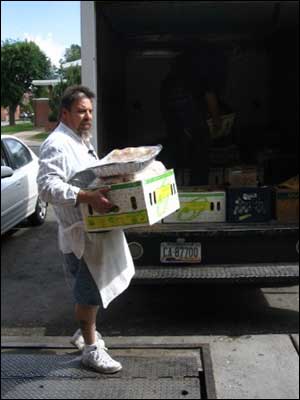Growing up in a family of restaurant owners, Bret Wojciak always had food available. But when he discovered others were not as lucky, he developed a hunger to help the hungry that wasn’t satisfied until he completed his senior project at Northern Arizona University.
Wojciak, a senior studying campus sustainability in an environmental science class, initiated NAU’s Food Surplus Donation Program to ensure that unused catered food on campus goes to a good cause instead of into a dumpster.
Since completing the project in May, the program has provided 4,500 meals to the less fortunate seeking sustenance at Flagstaff charitable organizations.
“I wanted to do something that mattered,” Wojciak said. “The biggest reward is in knowing that many less fortunate people are able to receive good, well-balanced meals that were once thrown away.”
Liz Bohlke, a resident district manager with Sodexho, the university’s food management company, said, “Each catered function at NAU is planned and organized to limit food waste, but often the number of people scheduled for an event is overestimated. By working with the Food Center we donated almost 1,500 pounds of food since last May. The program has not really changed the way we operate; however, we are more conscious before discarding food that we think can be used by others.”
Wojciak brought together NAU, Sodexho and the Flagstaff Family Food Center to create an effective partnership for food distribution. The groups established a schedule where the Food Center comes and picks up the unused food from NAU each Monday and Thursday, “or they are called to come and get it when a big event occurs,” he said.
The Food Center is in charge of packaging and transporting the food. It uses what it needs, and if it has received more food than it needs, it delivers food to other local non-profits such as Sharon Manor Transitional Housing Complex, a shelter for abused women and children, and the Northland Family Help Shelter.
“The results have been astounding,” said Pam Eddleman, executive director for Flagstaff Family Food Center. “We received enough food throughout the spring semester to serve hundreds of meals. Not only were we happy to receive the food, our clients were thrilled with the variety we were able to offer at mealtime.”
According to Wojciak, the biggest challenge was to cover the legal bases of donating food. He examined all national, state, local and organizational specific health requirements, standards and law pertaining to the food donation process and incorporated them into the program. He also requested that the program would become a permanent fixture for NAU by having it added to the food facilities management contract.
“Bret got everyone involved with figuring out the logistics, including weighing and tracking the donations,” said Gary Deason, the deputy director for NAU’s Center for Sustainable Environments and the professor teaching Wojciak’s environmental sustainability class. “I am delighted with this program because it accomplishes so many good things at once. It saves food, feeds the needy, reduces waste and builds campus-community partnerships for the common good. It also shows what one good idea and one determined student can accomplish.”
Until his December graduation, Wojciak will continue to balance his school requirements with work at his family’s restaurant, Brandy’s Restaurant and Bakery in Flagstaff.
“I have no immediate plans following graduation, but I was thinking of becoming a food donation consultant so other universities can follow in NAU’s footsteps,” he said. “What ever I end up doing, I hope I can continue to make a difference.”



